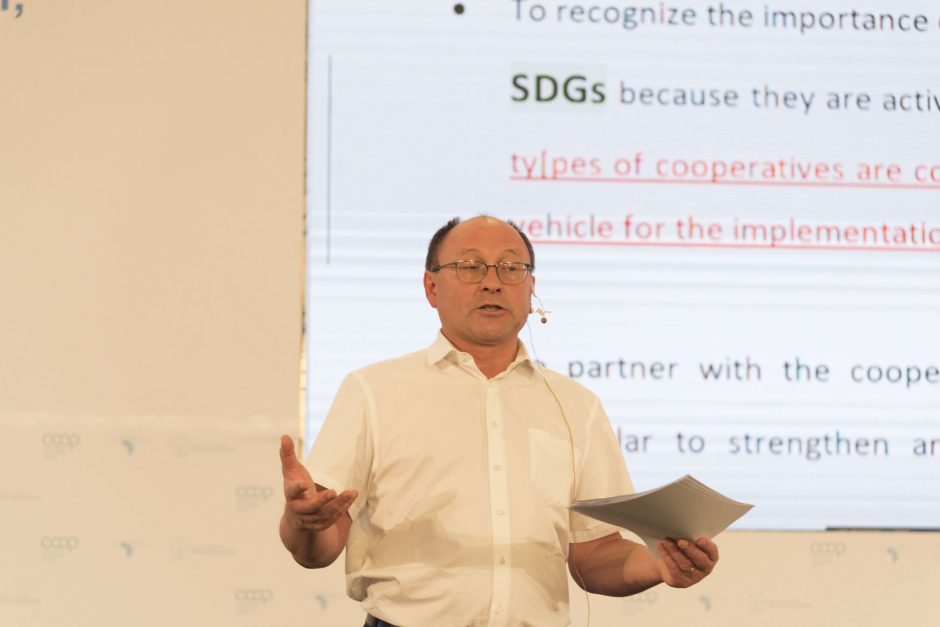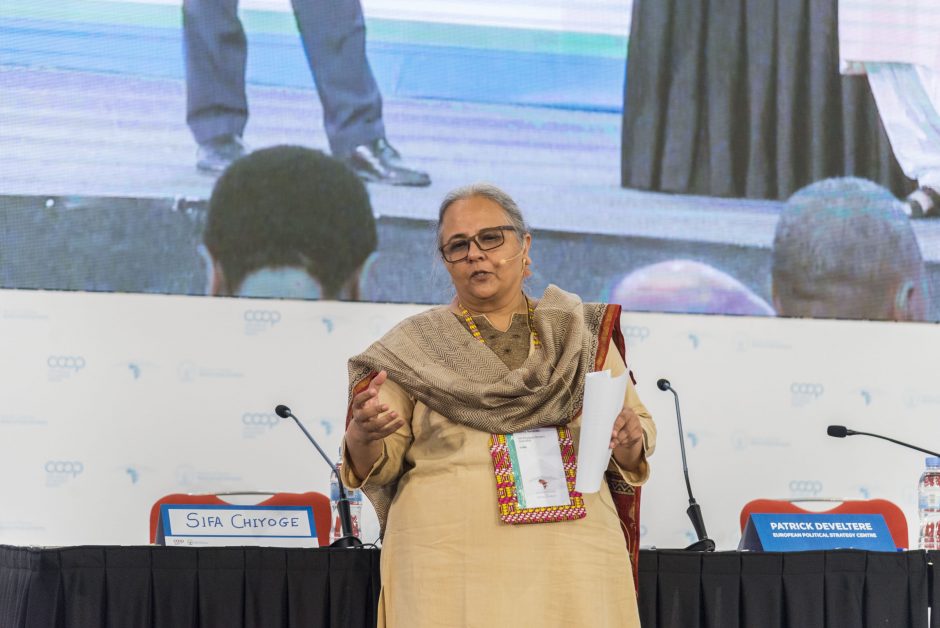‘Our message is this: we are here’
Reema Nanavaty and Dr Patrick Develtere presented final conclusions of the International Conference
“We do not live in a world of north and south, them and us,” said Dr Patrick Develtere, introducing the final session. “We are in an era of globalisation, we are all in the same boat. There is rising inequality in all societies. Climate change and new geopolitics are affecting all of us.”
Dr Develtere is a principal advisor of the European Political Strategy Centre (EPSC), the in-house thinktank of the European Commission. Since the 1980s, he said, the world has gone through a wave of neoliberalism, which promised ‘trickle-down’ economics that never delivered. “Many economies and societies are in shambles,” he added. “This is a challenge for cooperatives, but also an opportunity.”
He was co-presenting the session with Reema Nanavaty, head of the Self Employed Women’s Association’s (SEWA), where she leads economic and rural development activities reaching out to 17 million women and their families across India.
“What was encouraging to see at this conference was the commitment of cooperators, cooperatives and the cooperative movement,” she said. “It was good to see more emphasis on women’s leadership and participation, and the thinking around what is in store for the young people who will pave our future and the growth of cooperation the world over.”

“We have to embrace women’s leadership – and recognise that we have not been really good at it. […] We have to recognise that when we have more women in leadership, businesses perform better,” said Dr Develtere.
Together, Dr Develtere and Ms Nanavaty presented a draft summary of conclusions from the conference, which drew together thinking from its keynote, plenary and parallel sessions. The document reaffirmed commitment to the International Statement on the Cooperative Identity and emphasised the need for cooperatives to be recognised as an indispensable actor for the aspirational multi-stakeholder partnerships required to achieve sustainable development beyond 2030.
“Cooperatives play an important part in meeting the Sustainable Development Goals (SDGs) globally in creating a peaceful happy planet,” said Ms Nanavaty, highlighting how coops foster the values of openness and inclusivity to encourage partnerships across global communities. But, she added, the SDGs are important for coops too. “They are central to the future of what the cooperative movement wants to achieve.”
On education, Dr Develtere believes coops need to think about an alternative to traditional models: “From kindergarten onwards, you learn to compete. We need a system that teaches people to cooperate.” Governments have a role in this, he added. “They are there to integrate the idea of cooperation – not just competition – into the curriculum. You can advance while cooperating, not just competing. Cooperatives know this, they have this in their DNA.”
Cooperatives can contribute to nation-building by developing women’s leadership, he added. “We want communities to become more equal, we want to remove inequalities, improve democratic practices and bring the poor and the vulnerable into leadership. This increased participation will help end poverty, meeting SDG1.”
Both speakers agreed that, although cooperatives have principle 6 (cooperation among cooperatives), “we are not very good at it”. Dr Develtere gave the example of how coops involved in housing should benefit more from coops in renewable energy, adding: “Together we can do more”.
And data is needed to demonstrate just how cooperatives are advancing the SDGs.
On youth, Ms Nanavaty said a range of innovative financial and training services are needed for young people, to develop their entrepreneurial capacity. “Cooperative youth can build a transformative and inclusive world,” she said.
A major plea heard throughout the International Conference was for cooperatives to break out of their silos. Dr Develtere said: “Banking, housing, agriculture…’ we need to cooperate more with each other. And if we want to be a relevant actor to realise the SDGs, we also have to break out of the cooperative silo and increase our work with other actors on the SDGs.” This includes the environmental movement, trade unions, women’s movements and NGOs.
“We have a lot of homework to do, both as individuals and cooperatives.”

A call to governments
The second half of the conclusions urged governments and intergovernmental actors to enable a multi-stakeholder policy dialogue, acknowledging cooperatives as key actors for development at all levels.
“Coops are effective in meeting the SDGs because we work at those different levels,” said Ms Nanavaty. “Our message to governments and international agencies is this: we are here! We have proved that we can make change. Governments should recognise that we can do something. But we also have to be strengthened. We would like these organisations to help us develop capacity to get insights into what more we can do.’
Dr Develtere added that it would be helpful for governments to examine and report on existing legislation, “to look critically at the extent to which this allows us to do what we need to do”.
Closing the ceremony, Hon. Soraya Hakuziyaremye (Rwanda’s Minister of Trade and Industry) thanked the ICA for promoting cooperatives and carrying the message that coops act for betterment worldwide.
“Coops are an essential tool to reduce poverty,” she said.
“This conference reminds us of the importance of cooperatives in society and economy, but also allows us to rethink development model to ensure sustainability, peace and equality.”

